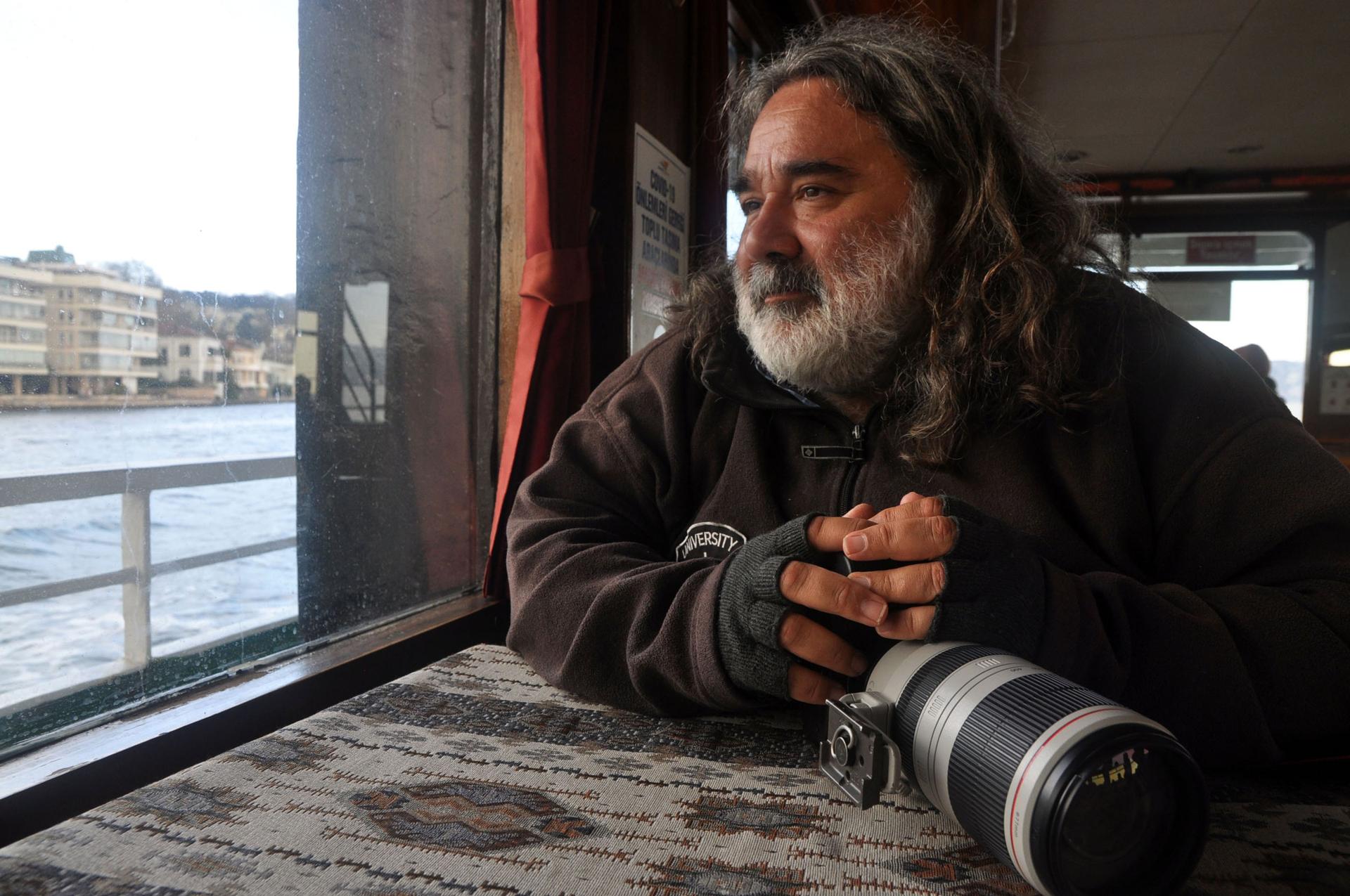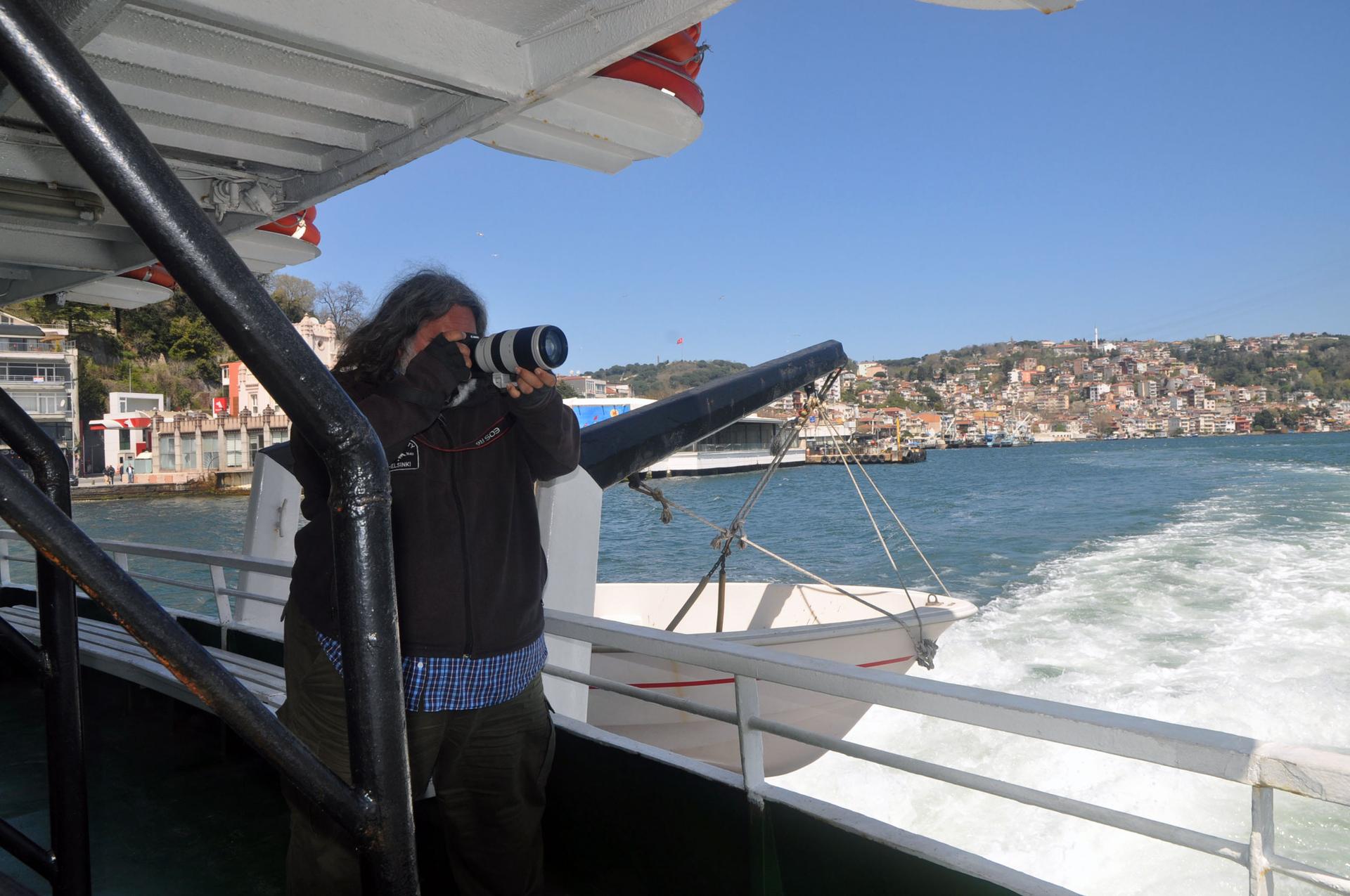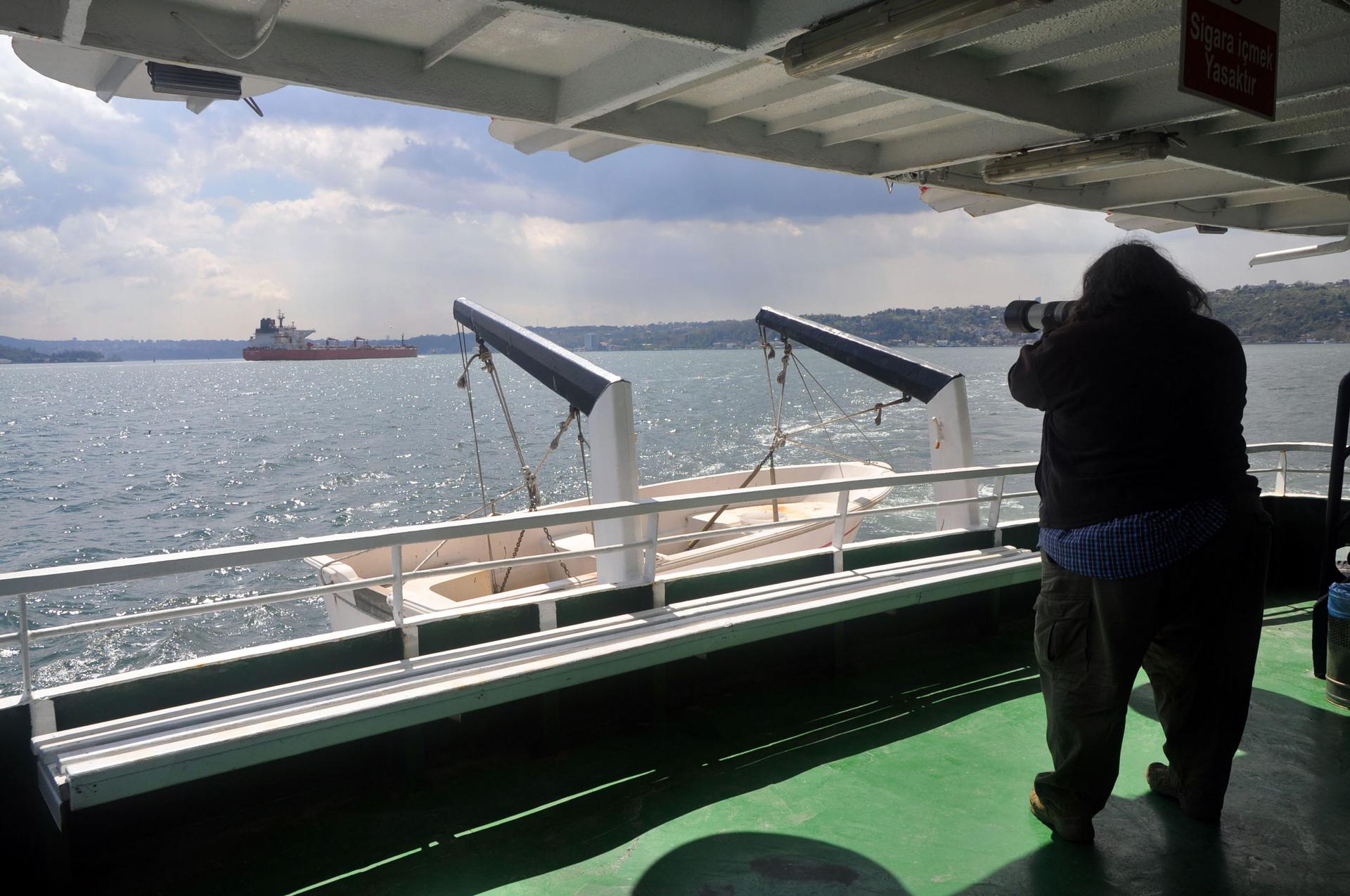When a heavy oil tanker, painted red, slid into view on April 12, Yörük Işık immediately hopped to his feet — training his camera on the horizon. With a few clicks on his phone, he pulled up its details.
“It didn’t declare a destination yet, so that’s interesting. It’s definitely carrying Russian crude,” he said, peering at the tanker.
Işık, an independent Istanbul-based geopolitical analyst, is among a small group of ship watchers — some hobbyists, some professionals — who observe ship traffic in Turkey’s Bosphorus Strait.
Işık often applies intel gathered to his work as a maritime consultant and as a non-resident scholar with the Middle East Institute.
With Russia burdened with sanctions amid the war in Ukraine, observing ship traffic in the Bosphorous can offer key insights into how Putin is funding his war efforts.
Since ancient times, the Bosphorus Strait has been one of the world’s busiest, and most strategic waterways, where ships often pass to transit goods throughout the world. On a daily basis, commuters of all kinds cross the Strait on 20-minute ferry rides, while small fishing boats crisscross the waters, dodging international cargo ships and the occasional military vessel.
To the untrained eye, it’s chaos. To Işık, it’s a carefully choreographed dance.
“Right now, we suddenly see ships carrying hydrocarbon goods — petrol and crude especially — to India. … Really, the Bosphorus is a place you can follow the world.”

“Right now, we suddenly see ships carrying hydrocarbon goods — petrol and crude especially — to India,” Işık said. “Really, the Bosphorus is a place you can follow the world.”
Tracking ships
Işık keeps an app on his smartphone called MarineTraffic, to show him which boats to expect. He looks for boats with an interesting element, like weapons exporters or a ship carrying the flag of a country that acts as a tax haven. Because the system relies on human-entered data, Yörük said he often finds ship operators trying to cheat the system.
“The ship might claim it’s going to a city in the south, but the ship you see is going north,” he said. “Or it looks like it’s coming from a totally different place than it claims it’s coming from.”
He runs a robust social media presence and a popular ship-spotting consultancy called the Bosphorus Observer. He happily accepts photos and tips from Turkish commuters and foreign sailors alike, crowdsourcing answers to his questions on the water.
From his perch on the Bosphorus, Işık has observed Gulf countries transport arms to fighters in Yemen and Libya. He watched as Russia ran troops and supplies to Syria to support Bashar al-Assad’s government. In 2016, he helped Dutch journalists track down a Russian tanker smuggling jet fuel to Syria.
Lately, Işık’s eyes are fixed on the Ukraine crisis.
In the run-up to the war, he watched as Russia used the Bosphorus to transfer navy ships from its positions in the Mediterranean to the Black Sea, one at a time. Back then, the Russian government claimed it was for military exercises.
“[Vladimir] Putin, since day one, has been engaged in wars. … But we continue to engage with Russia for energy security … and this is the result.”
“[Vladimir] Putin, since day one, has been engaged in wars,” Işık said. “But we continue to engage with Russia for energy security … and this is the result.”
Turkish officials have vocally condemned Russia’s invasion of Ukraine, and the country has sold military drones to the Ukrainian Armed Forces. But Turkey, a NATO member, has stopped short of joining Western sanctions against Russia.
In February, the Turkish government invoked the 1936 Montreux convention, which allows Turkey to ban foreign military ships from the Bosphorus and Dardanelles straits during times of war.
Işık turned his focus to commercial ships from Russia, which are still allowed to transit.
On a global scale, the Ukraine crisis is forcing freighters to lengthen routes to avoid violence near the Black Sea.
Russia, shut out by European markets through Western sanctions, is now selling oil for lower prices, to whomever will buy it — their destinations now further away than those of former customers. The actual volume of oil tankers transiting the Bosphorus Strait appears to be about the same, Işık noted, but their destinations have changed to places like India and China.
If a boat is headed toward the Gibraltar Strait, which is usually not a destination port, it could be a sign that its cargo might not have a buyer yet.
Other times, Işık spots cargo ships full of grain, a major export from both Ukraine and Russia. But Russian forces are reportedly blocking cargo shipments of grain out of Ukraine, raising concerns of food shortages in Latin America and sub-Saharan Africa.

Drifting mines
In recent weeks, drifting naval mines have also been found floating in the Turkish waters of the Black Sea. The US Embassy released a warning, urging caution if traveling by boat.
On March 31, Ukraine blamed Russia for planting mines along the coast, and allowing them to drift into open waters. The next day, Russia blamed Ukraine.
“Some mines look like the safety cap wasn’t even taken off … my personal suspicion is on Russia. … These are all Soviet-era mines, so just looking at it we cannot tell who it belongs to.”
“Some mines look like the safety cap wasn’t even taken off … my personal suspicion is on Russia,” Işık said. “These are all Soviet-era mines, so just looking at it we cannot tell who it belongs to.”
So far, the mines found in Turkish and Romanian waters have been safely detonated. But early last month, an Estonian cargo ship sank off the port city of Odessa after an explosion, possibly due to a stray mine. Four sailors remain missing.
Işık worries about the safety of people transiting the Black Sea if loose mines continue to pop up, but also about the effect they could have on commercial shipping — and the global economy.
“Many ports are already closed. It would add an amazing price for the insurance, et cetera. So, it might make it impossible for any legitimate company to operate,” Işık said.
But no matter what happens, he’ll be there to watch it.
